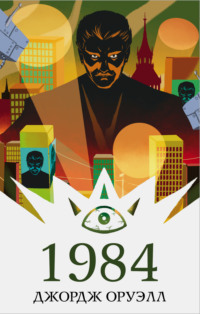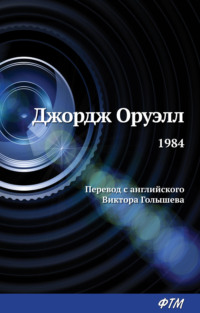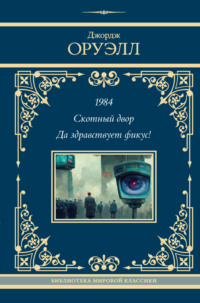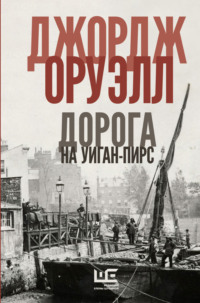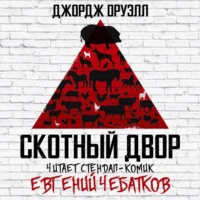
Полная версия
1984. Книга для чтения на английском языке
Before the Hate had proceeded for thirty seconds, uncontrollable exclamations of rage were breaking out from half the people in the room. The self-satisfied sheep-like face on the screen, and the terrifying power of the Eurasian army behind it, were too much to be borne: besides, the sight or even the thought of Goldstein produced fear and anger automatically. He was an object of hatred more constant than either Eurasia or Eastasia, since when Oceania was at war with one of these Powers it was generally at peace with the other. But what was strange was that although Goldstein was hated and despised by everybody, although every day and a thousand times a day, on platforms, on the telescreen, in newspapers, in books, his theories were refuted, smashed, ridiculed, held up to the general gaze for the pitiful rubbish that they were – in spite of all this, his influence never seemed to grow less. Always there were fresh dupes waiting to be seduced by him. A day never passed when spies and saboteurs acting under his directions were not unmasked by the Thought Police. He was the commander of a vast shadowy army, an underground network of conspirators dedicated to the overthrow of the State. The Brotherhood, its name was supposed to be. There were also whispered stories of a terrible book, a compendium of all the heresies, of which Goldstein was the author and which circulated clandestinely here and there. It was a book without a title. People referred to it, if at all, simply as the book. But one knew of such things only through vague rumours. Neither the Brotherhood nor the book was a subject that any ordinary Party member would mention if there was a way of avoiding it.
In its second minute the Hate rose to a frenzy. People were leaping up and down in their places and shouting at the tops of their voices in an effort to drown the maddening bleating voice that came from the screen. The little sandy-haired woman had turned bright pink, and her mouth was opening and shutting like that of a landed fish[11]. Even O’Brien’s heavy face was flushed. He was sitting very straight in his chair, his powerful chest swelling and quivering as though he were standing up to the assault of a wave. The dark-haired girl behind Winston had begun crying out “Swine! Swine! Swine!” and suddenly she picked up a heavy Newspeak dictionary and flung it at the screen. It struck Goldstein’s nose and bounced off; the voice continued inexorably. In a lucid moment Winston found that he was shouting with the others and kicking his heel violently against the rung of his chair. The horrible thing about the Two Minutes Hate was not that one was obliged to act a part, but, on the contrary, that it was impossible to avoid joining in. Within thirty seconds any pretence was always unnecessary. A hideous ecstasy of fear and vindictiveness, a desire to kill, to torture, to smash faces in with a sledgehammer, seemed to flow through the whole group of people like an electric current, turning one even against one’s will into a grimacing, screaming lunatic. And yet the rage that one felt was an abstract, undirected emotion which could be switched from one object to another like the flame of a blowlamp. Thus, at one moment Winston’s hatred was not turned against Goldstein at all, but, on the contrary, against Big Brother, the Party, and the Thought Police; and at such moments his heart went out to the lonely, derided heretic on the screen, sole guardian of truth and sanity in a world of lies[12]. And yet the very next instant he was at one with the people about him, and all that was said of Goldstein seemed to him to be true. At those moments his secret loathing of Big Brother changed into adoration, and Big Brother seemed to tower up, an invincible, fearless protector, standing like a rock against the hordes of Asia, and Goldstein, in spite of his isolation, his helplessness, and the doubt that hung about his very existence, seemed like some sinister enchanter, capable by the mere power of his voice of wrecking the structure of civilization.
It was even possible, at moments, to switch one’s hatred this way or that by a voluntary act. Suddenly, by the sort of violent effort with which one wrenches one’s head away from the pillow in a nightmare, Winston succeeded in transferring his hatred from the face on the screen to the dark-haired girl behind him. Vivid, beautiful hallucinations flashed through his mind. He would flog her to death with a rubber truncheon. He would tie her naked to a stake and shoot her full of arrows like Saint Sebastian. He would ravish her and cut her throat at the moment of climax. Better than before, moreover, he realized why it was that he hated her. He hated her because she was young and pretty and sexless, because he wanted to go to bed with her and would never do so, because round her sweet supple waist, which seemed to ask you to encircle it with your arm, there was only the odious scarlet sash, aggressive symbol of chastity.
The Hate rose to its climax. The voice of Goldstein had become an actual sheep’s bleat, and for an instant the face changed into that of a sheep. Then the sheep-face melted into the figure of a Eurasian soldier who seemed to be advancing, huge and terrible, his submachine gun roaring, and seeming to spring out of the surface of the screen, so that some of the people in the front row actually flinched backwards in their seats. But in the same moment, drawing a deep sigh of relief from everybody, the hostile figure melted into the face of Big Brother, black-haired, black-moustachio’d, full of power and mysterious calm, and so vast that it almost filled up the screen. Nobody heard what Big Brother was saying. It was merely a few words of encouragement, the sort of words that are uttered in the din of battle, not distinguishable individually but restoring confidence by the fact of being spoken. Then the face of Big Brother faded away again, and instead the three slogans of the Party stood out in bold capitals:
WAR IS PEACE
FREEDOM IS SLAVERY
IGNORANCE IS STRENGTH
But the face of Big Brother seemed to persist for several seconds on the screen, as though the impact that it had made on everyone’s eyeballs was too vivid to wear off immediately. The little sandy-haired woman had flung herself forward over the back of the chair in front of her. With a tremulous murmur that sounded like “My Saviour!” she extended her arms towards the screen. Then she buried her face in her hands. It was apparent that she was uttering a prayer.
At this moment the entire group of people broke into a deep, slow, rhythmical chant of “B—B!…B—B!…” – over and over again, very slowly, with a long pause between the first “B” and the second – a heavy, murmurous sound, somehow curiously savage, in the background of which one seemed to hear the stamp of naked feet and the throbbing of tom-toms. For perhaps as much as thirty seconds they kept it up. It was a refrain that was often heard in moments of overwhelming emotion. Partly it was a sort of hymn to the wisdom and majesty of Big Brother, but still more it was an act of self-hypnosis, a deliberate drowning of consciousness by means of rhythmic noise. Winston’s entrails seemed to grow cold. In the Two Minutes Hate he could not help sharing in the general delirium, but this sub-human chanting of “B—B!…B—B!” always filled him with horror. Of course he chanted with the rest: it was impossible to do otherwise. To dissemble your feelings, to control your face, to do what everyone else was doing, was an instinctive reaction. But there was a space of a couple of seconds during which the expression of his eyes might conceivably have betrayed him. And it was exactly at this moment that the significant thing happened – if, indeed, it did happen.
Momentarily he caught O’Brien’s eye. O’Brien had stood up. He had taken off his spectacles and was in the act of resettling them on his nose with his characteristic gesture. But there was a fraction of a second when their eyes met, and for as long as it took to happen Winston knew – yes, he knew! – that O’Brien was thinking the same thing as himself. An unmistakable message had passed. It was as though their two minds had opened and the thoughts were flowing from one into the other through their eyes. “I am with you,” O’Brien seemed to be saying to him. “I know precisely what you are feeling. I know all about your contempt, your hatred, your disgust. But don’t worry, I am on your side!” And then the flash of intelligence was gone, and O’Brien’s face was as inscrutable as everybody else’s.
That was all, and he was already uncertain whether it had happened. Such incidents never had any sequel. All that they did was to keep alive in him the belief, or hope, that others besides himself were the enemies of the Party. Perhaps the rumours of vast underground conspiracies were true after all – perhaps the Brotherhood really existed! It was impossible, in spite of the endless arrests and confessions and executions, to be sure that the Brotherhood was not simply a myth. Some days he believed in it, some days not. There was no evidence, only fleeting glimpses that might mean anything or nothing: snatches of overheard conversation, faint scribbles on lavatory walls – once, even, when two strangers met, a small movement of the hand which had looked as though it might be a signal of recognition. It was all guesswork: very likely he had imagined everything. He had gone back to his cubicle without looking at O’Brien again. The idea of following up their momentary contact hardly crossed his mind. It would have been inconceivably dangerous even if he had known how to set about doing it. For a second, two seconds, they had exchanged an equivocal glance, and that was the end of the story. But even that was a memorable event, in the locked loneliness in which one had to live.
Winston roused himself and sat up straighter. He let out a belch. The gin was rising from his stomach.
His eyes re-focused on the page. He discovered that while he sat helplessly musing he had also been writing, as though by automatic action. And it was no longer the same cramped, awkward handwriting as before. His pen had slid voluptuously over the smooth paper, printing in large neat capitals —
DOWN WITH[13] BIG BROTHER
DOWN WITH BIG BROTHER
DOWN WITH BIG BROTHER
DOWN WITH BIG BROTHER
DOWN WITH BIG BROTHER
over and over again, filling half a page.
He could not help feeling a twinge of panic. It was absurd, since the writing of those particular words was not more dangerous than the initial act of opening the diary, but for a moment he was tempted to tear out the spoiled pages and abandon the enterprise altogether.
He did not do so, however, because he knew that it was useless. Whether he wrote DOWN WITH BIG BROTHER, or whether he refrained from writing it, made no difference. Whether he went on with the diary, or whether he did not go on with it, made no difference. The Thought Police would get him just the same. He had committed – would still have committed, even if he had never set pen to paper – the essential crime that contained all others in itself. Thoughtcrime, they called it. Thoughtcrime was not a thing that could be concealed for ever. You might dodge successfully for a while, even for years, but sooner or later they were bound to get you.
It was always at night – the arrests invariably happened at night. The sudden jerk out of sleep, the rough hand shaking your shoulder, the lights glaring in your eyes, the ring of hard faces round the bed. In the vast majority of cases there was no trial, no report of the arrest. People simply disappeared, always during the night. Your name was removed from the registers, every record of everything you had ever done was wiped out, your one-time existence was denied and then forgotten. You were abolished, annihilated: vapourized was the usual word.
For a moment he was seized by a kind of hysteria. He began writing in a hurried untidy scrawl:
theyll shoot me i don’t care theyll shoot me in the back of the neck i dont care down with big brother they always shoot you in the back of the neck i dont care down with big brother —
He sat back in his chair, slightly ashamed of himself, and laid down the pen. The next moment he started violently. There was a knocking at the door.
Already! He sat as still as a mouse, in the futile hope that whoever it was might go away after a single attempt. But no, the knocking was repeated. The worst thing of all would be to delay. His heart was thumping like a drum, but his face, from long habit, was probably expressionless. He got up and moved heavily towards the door.
II
As he put his hand to the door-knob Winston saw that he had left the diary open on the table. DOWN WITH BIG BROTHER was written all over it, in letters almost big enough to be legible across the room. It was an inconceivably stupid thing to have done. But, he realized, even in his panic he had not wanted to smudge the creamy paper by shutting the book while the ink was wet.
He drew in his breath and opened the door. Instantly a warm wave of relief flowed through him. A colourless, crushed-looking woman, with wispy hair and a lined face, was standing outside.
“Oh, comrade,” she began in a dreary, whining sort of voice, “I thought I heard you come in. Do you think you could come across and have a look at our kitchen sink? It’s got blocked up and —”
It was Mrs. Parsons, the wife of a neighbour on the same floor. (“Mrs.” was a word somewhat discountenanced by the Party – you were supposed to call everyone “comrade” – but with some women one used it instinctively.) She was a woman of about thirty, but looking much older. One had the impression that there was dust in the creases of her face. Winston followed her down the passage. These amateur repair jobs were an almost daily irritation. Victory Mansions were old flats, built in 1930 or thereabouts, and were falling to pieces. The plaster flaked constantly from ceilings and walls, the pipes burst in every hard frost, the roof leaked whenever there was snow, the heating system was usually running at half steam when it was not closed down altogether from motives of economy[14]. Repairs, except what you could do for yourself, had to be sanctioned by remote committees which were liable to hold up even the mending of a window-pane for two years.
“Of course it’s only because Tom isn’t home,” said Mrs. Parsons vaguely.
The Parsons’ flat was bigger than Winston’s, and dingy in a different way. Everything had a battered, trampled-on look, as though the place had just been visited by some large violent animal. Games impediments – hockey-sticks, boxing-gloves, a burst football, a pair of sweaty shorts turned inside out – lay all over the floor, and on the table there was a litter of dirty dishes and dogeared exercise-books[15]. On the walls were scarlet banners of the Youth League and the Spies, and a full-sized poster of Big Brother. There was the usual boiled-cabbage smell, common to the whole building, but it was shot through by a sharper reek of sweat, which – one knew this at the first sniff, though it was hard to say how – was the sweat of some person not present at the moment. In another room someone with a comb and a piece of toilet paper was trying to keep tune with the military music which was still issuing from the telescreen.
“It’s the children,” said Mrs. Parsons, casting a half-apprehensive glance at the door. “They haven’t been out today. And of course —”
She had a habit of breaking off her sentences in the middle. The kitchen sink was full nearly to the brim with filthy greenish water which smelt worse than ever of cabbage. Winston knelt down and examined the angle-joint of the pipe. He hated using his hands, and he hated bending down, which was always liable to start him coughing. Mrs. Parsons looked on helplessly.
“Of course if Tom was home he’d put it right in a moment,” she said. “He loves anything like that. He’s ever so good with his hands, Tom is.”
Parsons was Winston’s fellow-employee at the Ministry of Truth. He was a fattish but active man of paralysing stupidity, a mass of imbecile enthusiasms – one of those completely unquestioning, devoted drudges on whom, more even than on the Thought Police, the stability of the Party depended. At thirty-five he had just been unwillingly evicted from the Youth League, and before graduating into the Youth League he had managed to stay on in the Spies for a year beyond the statutory age. At the Ministry he was employed in some subordinate post for which intelligence was not required[16], but on the other hand he was a leading figure on the Sports Committee and all the other committees engaged in organizing community hikes, spontaneous demonstrations, savings campaigns, and voluntary activities generally. He would inform you with quiet pride, between whiffs of his pipe, that he had put in an appearance at the Community Centre every evening for the past four years. An overpowering smell of sweat, a sort of unconscious testimony to the strenuousness of his life, followed him about wherever he went, and even remained behind him after he had gone.
“Have you got a spanner?” said Winston, fiddling with the nut on the angle-joint.
“A spanner,” said Mrs. Parsons, immediately becoming invertebrate. “I don’t know, I’m sure. Perhaps the children —”
There was a trampling of boots and another blast on the comb as the children charged into the living-room. Mrs. Parsons brought the spanner. Winston let out the water and disgustedly removed the clot of human hair that had blocked up the pipe. He cleaned his fingers as best he could in the cold water from the tap and went back into the other room.
“Up with your hands!” yelled a savage voice.
A handsome, tough-looking boy of nine had popped up from behind the table and was menacing him with a toy automatic pistol, while his small sister, about two years younger, made the same gesture with a fragment of wood. Both of them were dressed in the blue shorts, grey shirts, and red neckerchiefs which were the uniform of the Spies. Winston raised his hands above his head, but with an uneasy feeling, so vicious was the boy’s demeanour, that it was not altogether a game.
“You’re a traitor!” yelled the boy. “You’re a thought-criminal! You’re a Eurasian spy! I’ll shoot you, I’ll vaporize you, I’ll send you to the salt mines!”
Suddenly they were both leaping round him, shouting “Traitor!” and “Thought-criminal!” the little girl imitating her brother in every movement. It was somehow slightly frightening, like the gambolling of tiger cubs which will soon grow up into man-eaters. There was a sort of calculating ferocity in the boy’s eye, a quite evident desire to hit or kick Winston and a consciousness of being very nearly big enough to do so. It was a good job it was not a real pistol he was holding, Winston thought.
Mrs. Parsons’ eyes flitted nervously from Winston to the children, and back again. In the better light of the living-room he noticed with interest that there actually was dust in the creases of her face.
“They do get so noisy,” she said. “They’re disappointed because they couldn’t go to see the hanging, that’s what it is. I’m too busy to take them, and Tom won’t be back from work in time.”
“Why can’t we go and see the hanging?” roared the boy in his huge voice.
“Want to see the hanging! Want to see the hanging!” chanted the little girl, still capering round.
Some Eurasian prisoners, guilty of war crimes, were to be hanged in the Park that evening, Winston remembered. This happened about once a month, and was a popular spectacle. Children always clamoured to be taken to see it. He took his leave of Mrs. Parsons and made for the door. But he had not gone six steps down the passage when something hit the back of his neck an agonizingly painful blow. It was as though a red-hot wire had been jabbed into him. He spun round just in time to see Mrs. Parsons dragging her son back into the doorway while the boy pocketed a catapult.
“Goldstein!” bellowed the boy as the door closed on him. But what most struck Winston was the look of helpless fright on the woman’s greyish face.
Back in the flat he stepped quickly past the telescreen and sat down at the table again, still rubbing his neck. The music from the telescreen had stopped. Instead, a clipped military voice was reading out, with a sort of brutal relish, a description of the armaments of the new Floating Fortress which had just been anchored between lceland and the Faroe Islands.
With those children, he thought, that wretched woman must lead a life of terror. Another year, two years, and they would be watching her night and day for symptoms of unorthodoxy. Nearly all children nowadays were horrible. What was worst of all was that by means of such organizations as the Spies they were systematically turned into ungovernable little savages, and yet this produced in them no tendency whatever to rebel against the discipline of the Party. On the contrary, they adored the Party and everything connected with it. The songs, the processions, the banners, the hiking, the drilling with dummy rifles, the yelling of slogans, the worship of Big Brother – it was all a sort of glorious game to them. All their ferocity was turned outwards, against the enemies of the State, against foreigners, traitors, saboteurs, thought-criminals. It was almost normal for people over thirty to be frightened of their own children. And with good reason[17], for hardly a week passed in which the Times did not carry a paragraph describing how some eavesdropping little sneak – “child hero” was the phrase generally used – had overheard some compromising remark and denounced its parents to the Thought Police.
The sting of the catapult bullet had worn off. He picked up his pen half-heartedly, wondering whether he could find something more to write in the diary. Suddenly he began thinking of O’Brien again.
Years ago – how long was it? Seven years it must be – he had dreamed that he was walking through a pitch-dark room. And someone sitting to one side of him had said as he passed: ‘We shall meet in the place where there is no darkness.’ It was said very quietly, almost casually – a statement, not a command. He had walked on without pausing. What was curious was that at the time, in the dream, the words had not made much impression on him. It was only later and by degrees that they had seemed to take on significance. He could not now remember whether it was before or after having the dream that he had seen O’Brien for the first time, nor could he remember when he had first identified the voice as O’Brien’s. But at any rate the identification existed. It was O’Brien who had spoken to him out of the dark.
Winston had never been able to feel sure – even after this morning’s flash of the eyes it was still impossible to be sure whether O’Brien was a friend or an enemy. Nor did it even seem to matter greatly. There was a link of understanding between them, more important than affection or partisanship. “We shall meet in the place where there is no darkness,” he had said. Winston did not know what it meant, only that in some way or another it would come true.
The voice from the telescreen paused. A trumpet call, clear and beautiful, floated into the stagnant air. The voice continued raspingly:
“Attention! Your attention, please! A newsflash has this moment arrived from the Malabar front. Our forces in South India have won a glorious victory. I am authorized to say that the action we are now reporting may well bring the war within measurable distance of its end. Here is the newsflash —”
Bad news coming, thought Winston. And sure enough, following on a gory description of the annihilation of a Eurasian army, with stupendous figures of killed and prisoners, came the announcement that, as from next week, the chocolate ration[18] would be reduced from thirty grammes to twenty.
Winston belched again. The gin was wearing off, leaving a deflated feeling. The telescreen – perhaps to celebrate the victory, perhaps to drown the memory of the lost chocolate – crashed into “Oceania, ’tis for thee”. You were supposed to stand to attention[19]. However, in his present position he was invisible.
“Oceania, ’tis for thee” gave way to lighter music. Winston walked over to the window, keeping his back to the telescreen. The day was still cold and clear. Somewhere far away a rocket bomb exploded with a dull, reverberating roar. About twenty or thirty of them a week were falling on London at present.






